
Is the new 9-1 GCSE chemistry harder?
tl; dr Yes, it’s harder. There is more content, harder content and the difficulty of questions is increased. Just not to the extent that some of the media hype would have you believe.
The question of whether the new ‘9-1’ chemistry GCSE is harder is one I’m sure every teacher is getting asked a lot. I know I am, by parents and students who are being barraged by messages in the media telling them that these new exams are gruelling and even unfairly difficult compared to the outgoing qualifications. Many students are also curious to know if the exams they’re going to take are harder than the ones their siblings took, or harder than the O-Levels their parents took.
I decided to compare the new chemistry GCSE with the old by considering the ways in which they’re different, then evaluating whether each change can rightly be judged to be more difficult.
Though some of these opinions are unavoidably subjective, I’ve tried to set aside my own feelings here and be as objective as possible. I’ve also tried to keep it free from “back in my day…”, which as parents and teachers we’re all guilty of from time to time whenever the issue of old and new qualifications surfaces, and consider this from the perspective of a year 11 student about to sit these exams.
My analysis focuses on GCSE chemistry, but much of the conclusions here apply to biology and physics too. I’ve considered all boards and the IGCSE, though some of what I’ve said below doesn’t apply to CIE.
The new GCSE chemistry curriculum
Substantial changes have been made, with many additions to the syllabus and just a few deletions. Notably, many of the ‘chemistry in context’ topics have gone (such as rocks, the limestone cycle, hard and soft water, catalytic converters, biofuels, oils, fats and soaps) as have some areas of overlap with biology and AS chemistry.
Overall, the shift is towards more factual content that provides a solid platform for A Level. Undoubtedly, some of the new content is more challenging and there is a lot more content.
An important aspect of the new science curriculum is Working scientifically. As its name suggests, this is about teaching students to understand the methods of science and not simply view it as a rigid body of facts. Working scientifically spans four areas:
- Development of scientific thinking
- Experimental skills and strategies
- Analysis and evaluation
- Scientific vocabulary, quantities, units, symbols and nomenclature
These skills were collectively called How science works in the old curriculum, the difference now is they are more deeply integrated and more rigorously assessed.
Difficulty of questions
Once you’ve made your curriculum more difficult, how do you make exams harder? Much of it comes down to Assessment Objectives (AOs) and command words. AOs state in general terms what a student should be able to do to earn the GCSE. Command words turn those into content-specific instructions given to a student in an exam question. For example, “evaluate whether increasing temperature or pressure has the greatest effect.”
Both the new and old GCSEs have three AOs, but the requirements and weightings differ:
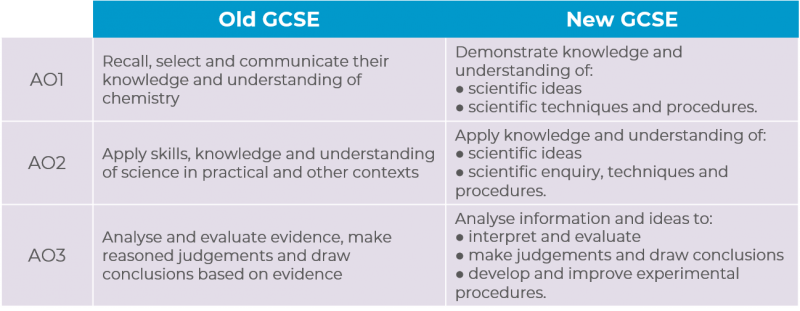
To simplify this eduspeak, AO1 is about knowing, whilst AO2 and AO3 are about applying knowledge. There is therefore a slight shift towards understanding and a reduction in rote learning of facts. If you accept the premise that it’s harder to apply your understanding than it is to regurgitate facts (and thus AO1 is the ‘easier’ of the three objectives) then the new GCSEs are more difficult.

This manifests on an exam paper as an increased proportion of command words linked to AO2 and AO3. Meaning, students can expect more questions asking them to compare, evaluate, plan, predict and the dreaded suggest (asking students to deal with unfamiliar contexts), and fewer questions needing them to state, list, define and label.
The difficulty also increases within questions and progressively throughout a paper. The early part of a question will typically be of lower demand (aimed at students targeting grades 1-3), ramping to standard demand (grades 4-5) and high demand (grades 6-9).
In terms of question types, students will have to answer a mix of multiple-choice questions, short answer questions, a higher proportion of calculations, and extended answer questions worth more marks. Multiple choice questions are not entirely new (CIE for instance have a whole paper of them) but there are now more of them, requiring students to learn the knack of answering them and manage their time carefully in the exam. The shift towards longer answer questions that are graded according to quality of response will require students to give answers that are accurate, detailed and well-structured to attract full marks.
Also notable is that the skills underpinning Working scientifically – scientific enquiry, techniques and experimental procedures – are now more firmly integrated throughout AOs, and as discussed below, are now entirely assessed by written exams instead of through assessed practical coursework.
New GCSE grading system
The new numerical grading system grades students on a scale from 1-9, with a grade 4 equalling a “standard pass”, a grade 5 equalling a “strong pass”, and grades 7, 8 and 9 equating to an A or A* under the old system. The highest grade 9 is expected to be awarded to only around 3.5% of students.
To ensure the new cohort are not guinea pigs for the new exams and new grading system, the principle of comparable outcomes is being used to fix the proportion of grades awarded based on prior attainment, which necessitate an initial lowering of grade boundaries. Roughly the same proportion of students that previously scored a C or above will achieve a grade 4 and above, and roughly the same proportion that achieved As and A*s will achieve a grade 7 and above.
You can see how this worked for summer 2018’s exams, when 43.3% of students achieved grades 7 – 9 compared to the previous year where 42% of students achieved A*-A. It’s not coincidence; grade boundaries were adjusted to ensure this outcome.
The expectation is that grade boundaries will rise as students and teachers become more familiar with the new exams and assessment materials become more widely available.
Adjusting grade boundaries each year according to cohort performance is normal practice and is not itself a sign a qualification is overall harder. But the creation of three top grades to give the most able students opportunities to shine means the inclusion of content and questions that are accessible only by top students. This certainly raises the overall qualification difficulty.
Linear exams
A big change is the shift from modular to linear exams, with students sitting exams at the end of two years. A criticism of the modular system was that students could take exams after completing a module and then resit it to try to ‘bank’ the best grade. It also didn’t help students to build connections between different areas of science, since content was drip-fed in isolated modules and subsequent modules didn’t always reinforce earlier content.
The difficulty posed by linear exams after two years is of course the need for students to revise two years’ worth of information. That requires better study skills in order to connect seemingly unrelated concepts together and see the ‘bigger picture’, as well as the ability to memorise the significant body of procedural knowledge needed for all those new calculations and practical questions.
No coursework
Coursework for old GCSE sciences meant assessed practicals, where students would plan and carry out experiments under controlled conditions. These have been scrapped and practical science is now taught through Working scientifically and through eight mandatory practicals designed to familiarise students with key apparatus and techniques.
Practical skills are now tested entirely by written exams, with 15% of all available marks across the two papers dedicated to assessing them. The challenge this poses for students and teachers is in how to ensure the practical experience needed to answer practical exam questions is acquired. When coursework was scrapped for the new A levels, the first year to sit the new chemistry papers notably did not perform well in practical questions, with examiner reports citing students’ lack of appreciation over why certain techniques and processes are used in experiments.
More maths
It is now a requirement that 20% of marks test mathematical skills which, for Higher Tier papers (aimed at students targeting grades 4 to 9), are of a standard ‘not lower than that of GCSE Foundation Tier maths‘. Expect lots of “what was that, a maths paper??!!” exit Tweets on exam day. As well as increasing the amount of maths, there is also more calculation-based content (e.g. more mole calculations and for the top students, multi-step titration calculations that border on A level difficulty) .
Lack of past papers
This is the main source of anxiety for many students. Past papers help students become familiar with the style and difficulty of exam-style question, give them an understanding of what mark schemes require, and help them improve their exam technique. They have become a vital part of exam preparation and students sitting the outgoing GCSEs had years’ worth of past papers they could access. Students taking the new GCSEs in 2019 will have only specimen papers and the summer 2018 papers to use as practice papers, plus assessment materials produced by 3rd parties.
Many of the questions written for the old GCSEs are still valid for the new qualifications and can be accessed in old past papers. However, these legacy exam papers contain content now deleted, will have new content missing, and the style and difficulty of questions won’t entirely reflect that of the new exams.
From a teaching perspective, I find this a good thing – it shifts the emphasis back towards understanding and away from exam coaching and rehearsed answers – but since I’m looking at this more from the student’s perspective, then this makes the new exams harder.
Overall conclusion:
Is the new GCSE chemistry harder than the old? I think so.
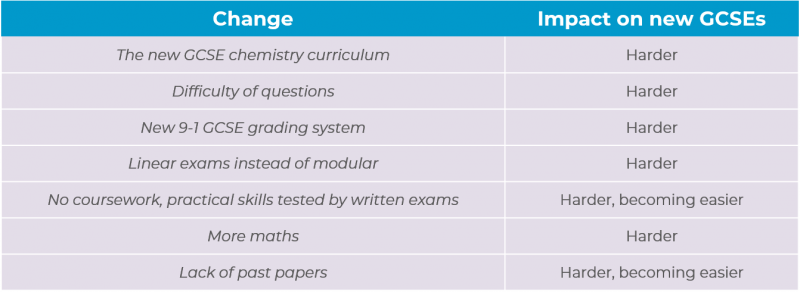
Some of the difficulties introduced with the new GCSEs will ease as students and teachers get to know the new qualifications better. But with more content, harder content, harder questions and more maths, the new chemistry GCSE is unquestionably tougher.
Agree? Disagree? Let me know in the comments section!

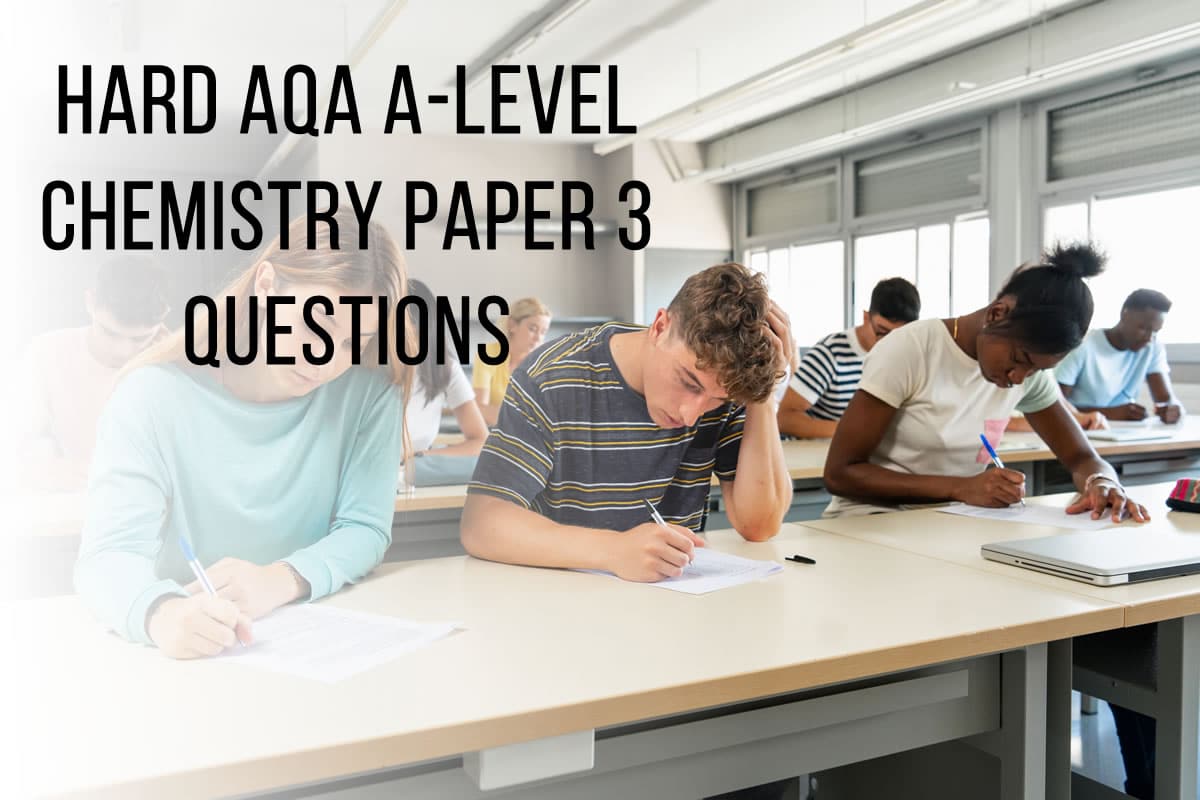
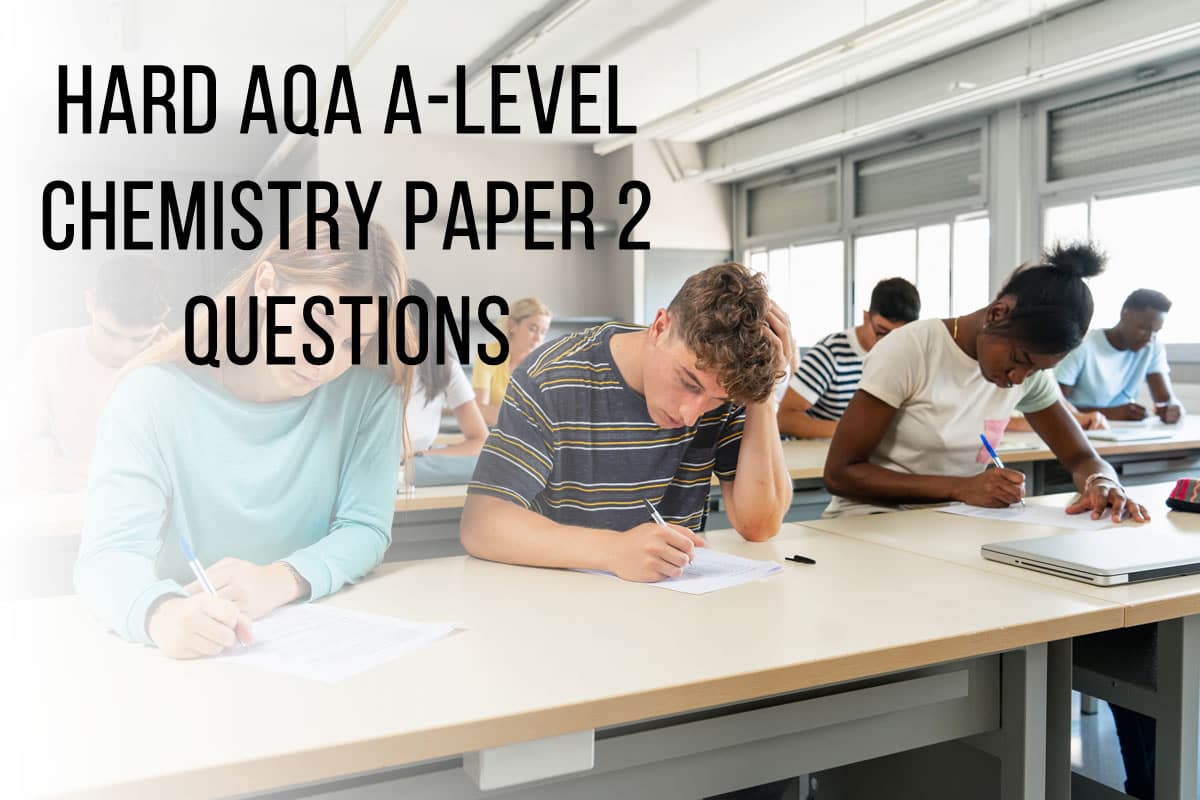
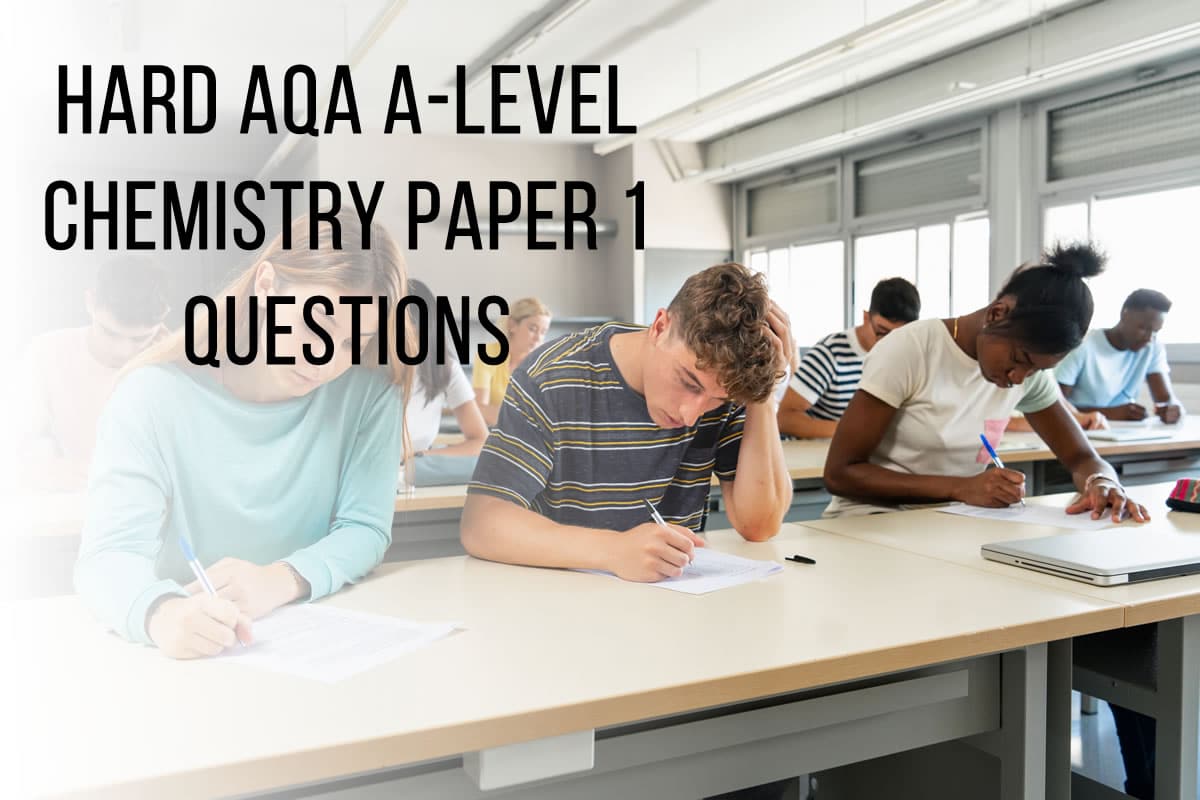
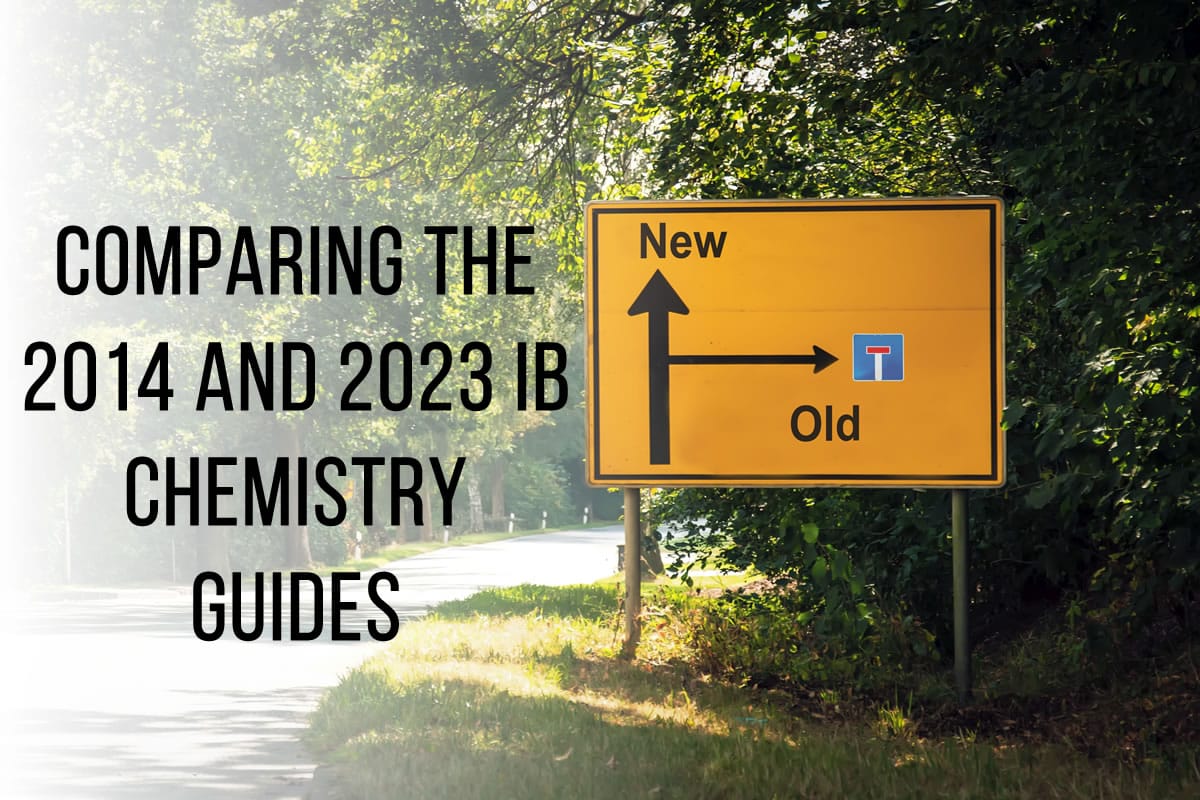

THanks Dr Carl for this most useful post. I wholly agree with these points. Do you really think the practical aspects of the course will get easier though, just because assessment materials become more widely available? I find it one area that is hard to prepare students for, no matter how the resources.
I appreciate the article and systematic approach nonetheless. Hope your students fared well today 🙂